Croatia Logs 379 New Coronavirus Cases, 28 Dead
ZAGREB, 17 January, 2021 - In the past 24 hours 379 cases of SARS-CoV-2 infection have been registered in Croatia as well as 28 related deaths, the national COVID-19 response team said on Sunday.
In said period 4,669 persons have been tested for coronavirus.
The number of active cases stands at 4,058, including 1,761 hospitalised patients, 147 of whom are on ventilators.
Presently 17,382 people are self-isolating.
Since 25 February 20202, when Croatia registered the first case of coronavirus, 224,954 people have been infected with it and 4,616 have died as a consequence.
To date 1,118,525 people have been tested for the new virus and 216,280 have recovered from it, including 1,004 in the past 24 hours.
Croatian ECA Seaplanes Rising Again as Isla Air Express in Canary Islands?
January 17, 2021 - Several years after the failure of European Coastal Airlines in Croatia, a new seaplane startup in Spain, Isla Air Express, bears a striking resemblance.
It is more than six years since modern aviation history was made on the island of Hvar, with the first scheduled seaplane flight in modern times in Europe, as a European Coastal Airlines Twin Otter touched down on the Adriatic just outside the harbour of Jelsa on August 27, 2014, following a 15-minute flight from Resnik, just next to Split Airport.
A new revolutionary era of Croatian travel was upon us - or so it seemed - and the excitement was palpable in Jelsa on that historic first day.
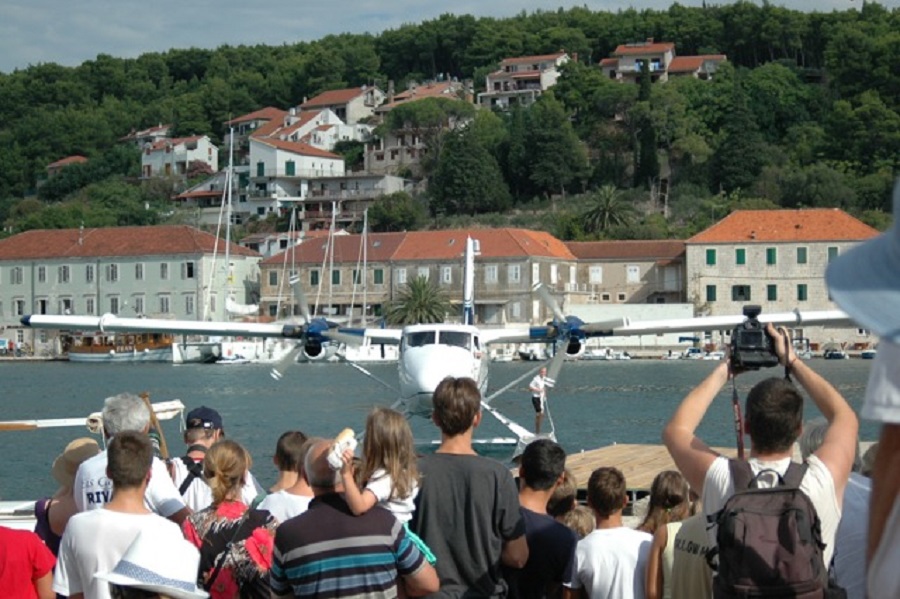
The project was fantastic, connecting the islands and the coast not only with each other, but also international destinations, with both Ancona and Pescara added, offering direct flights to downtown Split, for example.
And when the system worked, it was truly fantastic. I will never forget the joy of leaving my house to the Jelsa station and disembarking in downtown Split just 30 minutes later, or being able to attend a meeting in Novigrad in Istria via seaplane flights from Jelsa to Resnik and Pula and back, returning by 19:00 the very same evening.
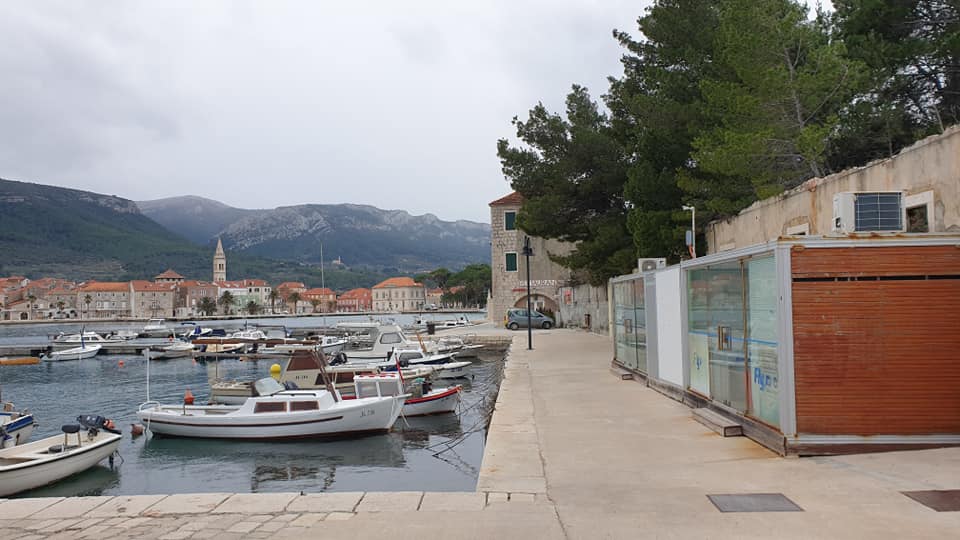
Sadly, the euphoric early days were short-lived. Initial problems with cancelled flights due to the weather or maintenance issues led to numerous tourists missing their flight home.
Everyone agreed that when the system worked, it was magnificent, a great addition to Croatia's luxury tourism offer. The maths didn't seem to add up to anyone who cast a glance at the numbers, but then what did we know? A one-way flight from Split to Jelsa was between 25 and 40 euro, for example, and the plane would go with just one passenger. Which it frequently did.
And then, in August 2016, just two years after operations had commenced - the bombshell. Leading Croatian news portal Index.hr published an article with supporting photographs questioning the safety of the planes. Soon after, the Croatian Civil Aviation Authority grounded the fleet in the middle of peak season, while an investigation was carried out. Shortly after, one plane was allowed to fly again briefly before being grounded again.
Soon after, ECA declared bankruptcy, leaving some staff and many suppliers unpaid. A lawsuit of 22.5 million euro was launched by ECA against the Croatian Civil Aviation Authority - a lawsuit which failed.
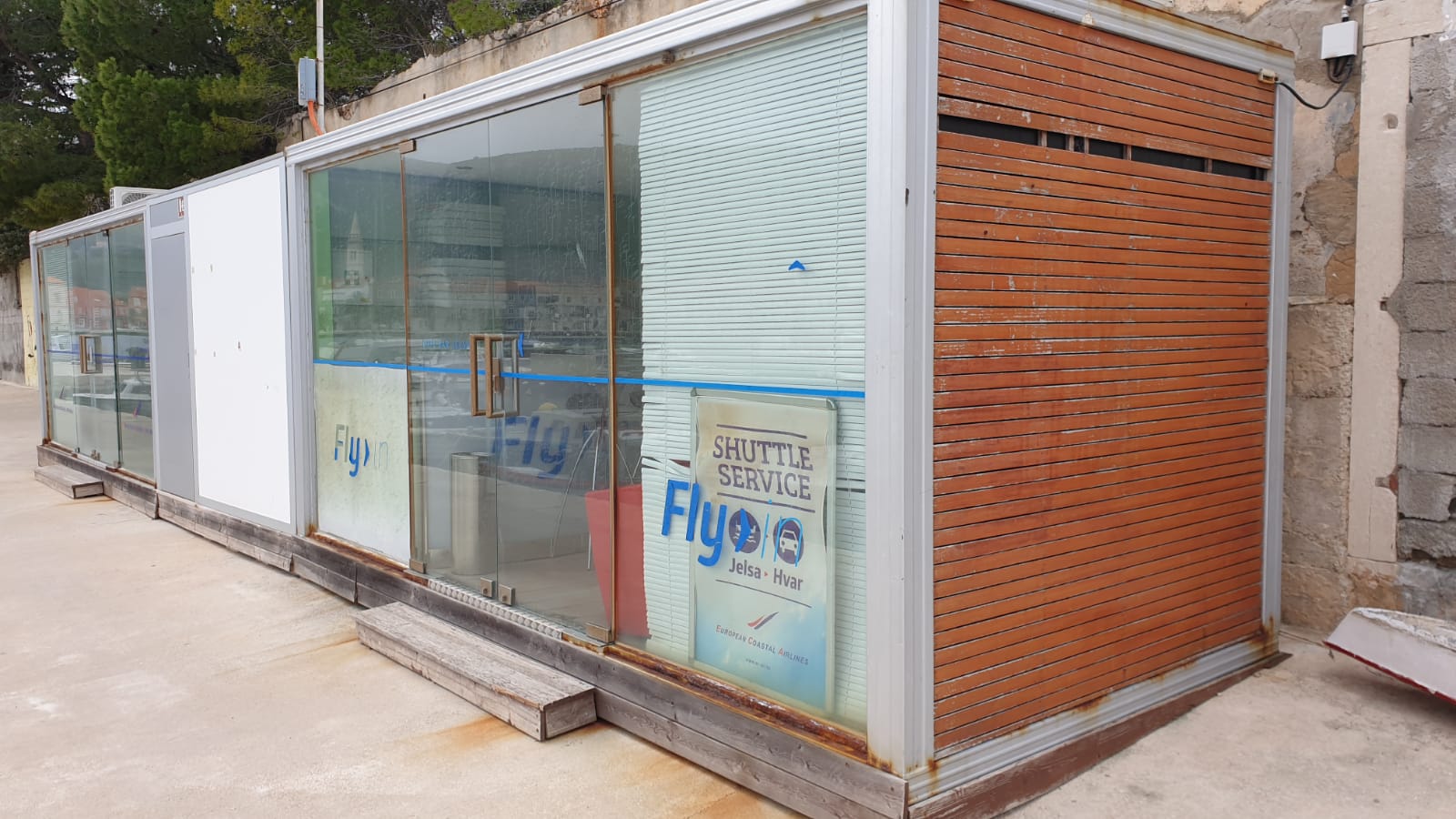
Jelsa today, home to the first scheduled seaplane flight in modern European aviation history. The office is still there, all the equipment still inside, promising shuttles to Hvar Town. Although a little rusty, passers-by could be forgiven for thinking this was an active seaplane operation closed for the day.
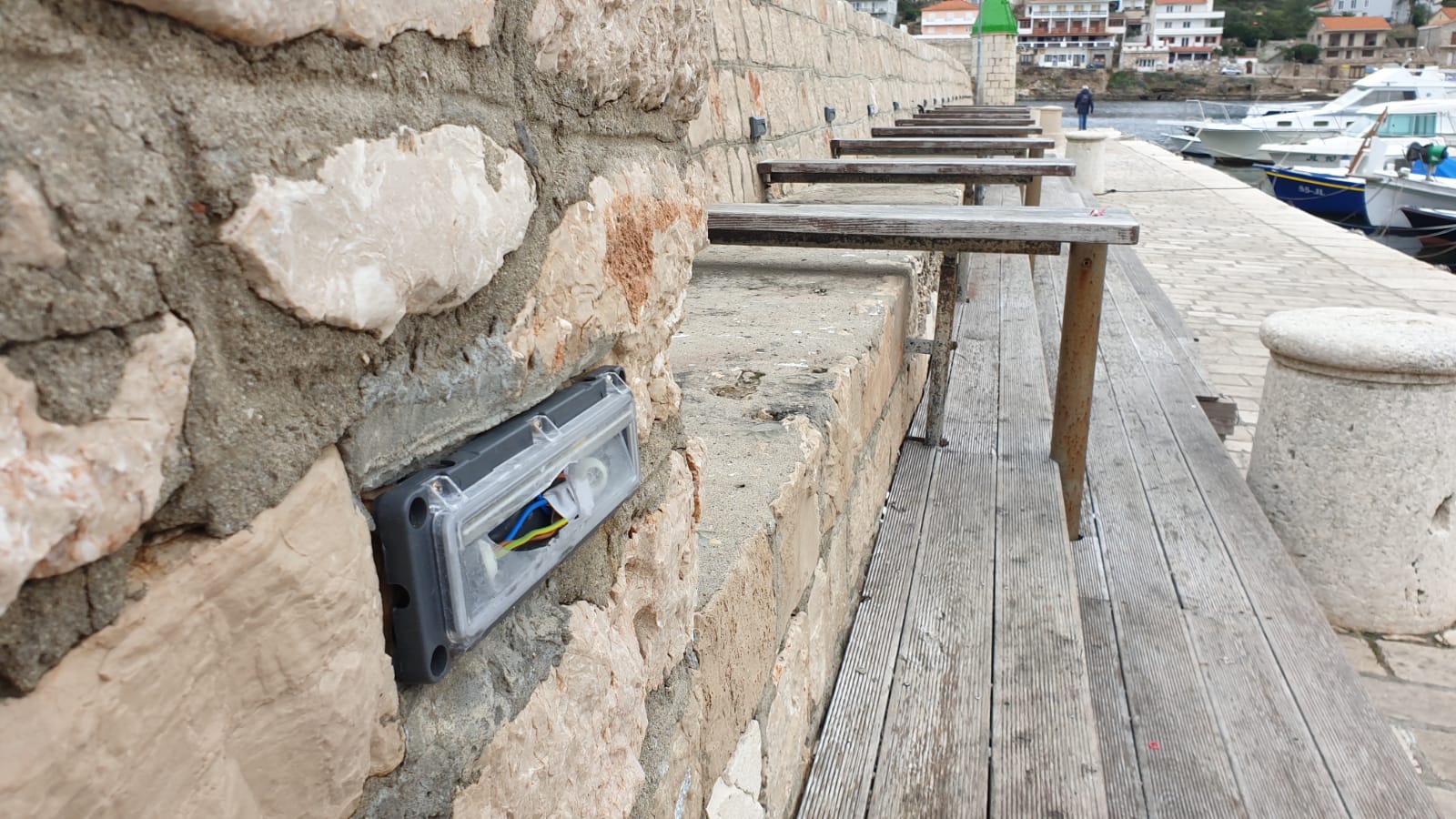
The weather-worn seating for the cafe which never opened still sports some lights on the wall behind, at least those which have not been damaged.
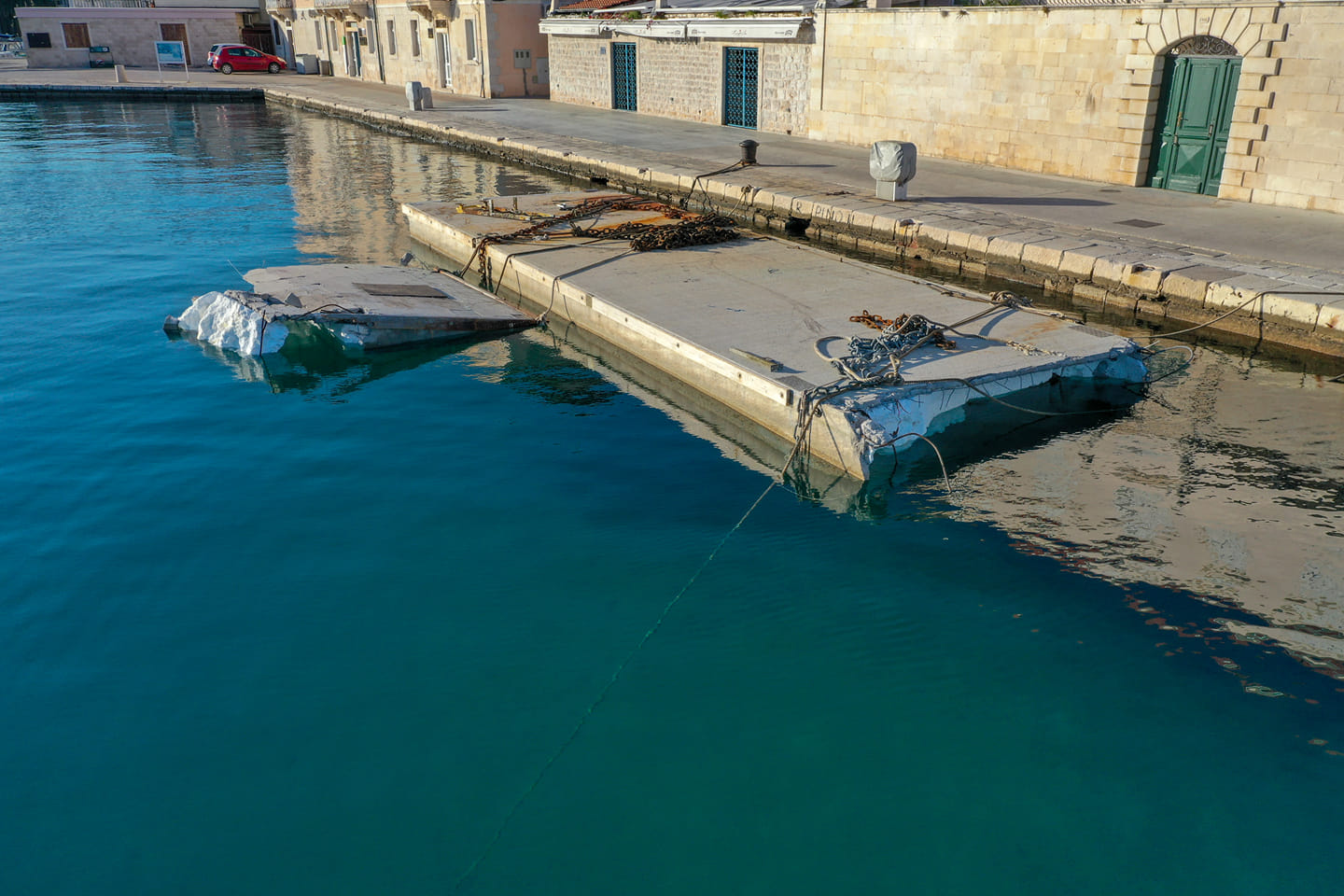
The pontoon, which was used several years ago to help passengers board the plane, caused something of an environmental crisis a few weeks ago. Having been moved to another location to be used by a private business, it came apart during a strong bura wind, releasing the styropor it contained into the Adriatic and a nearby beach. What remains of the pontoon is today attached to the harbour in the pretty Jelsa marina, its future fate uncertain.
A sad end to the story in Jelsa, which had looked so promising when it began.
(www.islaair.com screenshot)
But not, it seems, the end of the story for those behind European Coastal Airlines, or its co-founder and CEO Klaus Dieter Martin. A new seaplane operation, Isla Air Express, has been announced in Spain, with its website bearing photographs and footage of the ECA fleet in action.
In its initial phase, the Isla Air Express website promises several daily flights between Ibiza, Palma, Menorca and Formentera, before adding Valencia and Alicante in Phase 2.
Leading flight data specialists, ch-aviation, reported in more depth on the new startup in a recent article, Spanish seaplane project Isla Air Express takes shape.
According to Isla Air Express Director-General, Sergio Nuñez-Cacho, the company had secured financing and was pursuing a Maltese AOC. Two DNG-6-300 amphibians are currently receiving maintenance in Marseilles, and operations are due to start in June 2021, subject to any COVID-19 delays. Nuñez-Cacho named Klaus-Dieter Martin as the main shareholder of the company. According to ch-aviation:
Isla Air Express was officially registered in the Balearic Islands on April 3, 2019, ch-aviation found. It was established in Palma on December 13, 2018, to provide scheduled and non-scheduled air transport of passengers, luggage, mail, and merchandise of all kind. As principals are listed two German companies: RJB Aviation Consulting GmbH and European Sea Plane Service GmbH, the former co-owner of European Coastal Airlines.
Will the seaplanes succeed in Spain where they failed in Croatia? Time will tell.
Will anyone come and take away the abandoned mess that has been left in Jelsa and other Croatian destinations? That one is perhaps easier to answer.
Read more - Why Did Seaplanes Fail in Croatia and Will They Fly Again? Industry Expert Interview from November 2018.
Of Borders and PCR Tests: Reflections on a Balkan Road Trip During the Pandemic
January 17, 2021 - Taking a Balkan road trip during the pandemic with limited information can be a challenge. A recent border crossing experience from Croatia to Albania, via Bosnia and Hercegovina, Montenegro, and back.
"Do you have your PCR test for Montenegro?" asked the Croatian border guard, while scanning my passport.
"No, because they are no longer required."
"Yes they are."
"My information is that they are no longer required since yesterday."
The official picked up the phone, asked someone on the Montenegrin side, then confirmed that yes, in fact, I was right. Test no longer required.
"Good to know," he said, before handing me my passport and wishing me a good trip.
Good to know indeed, I thought to myself. But if the border guards are not up to date with the latest situation, what chance for travellers? There has been such confusion about travel regulations with the lack of clear official information for months now, and the number of people seeking advice on the Total Croatia Travel INFO Viber community is a testament to that.
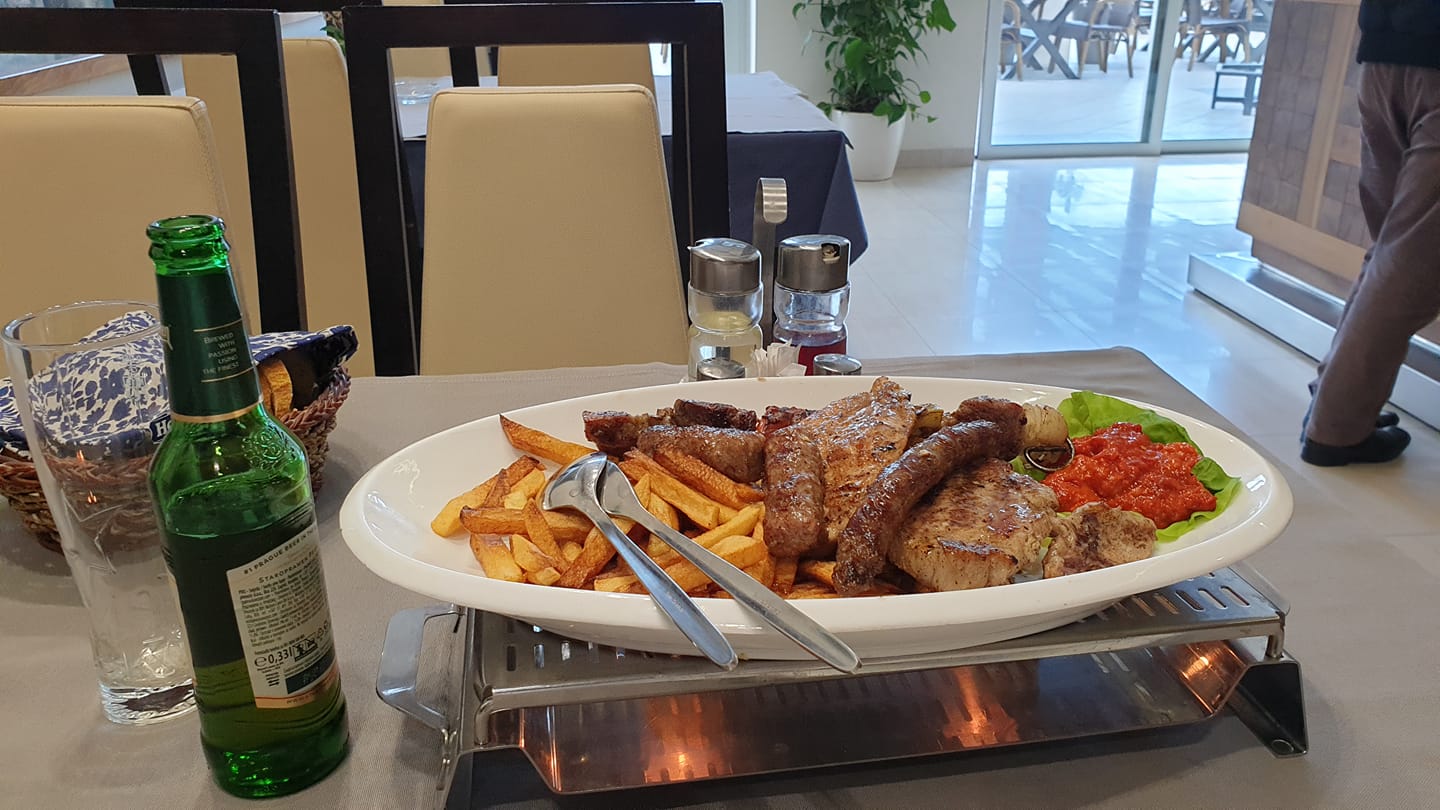
Having been mostly stuck on my sofa working online for the last couple of months, especially after living in a country whose cafes and restaurants have been shut for weeks, the prospect of a 12-hour drive from Varazdin to Tirana filled me with a little trepidation. Among the key worries was how easy it would be to cross the border, and whether or not the information I had found online had been correct. And if I did need a PCR test, where could I get one quickly in Dubrovnik?
As I sailed down the motorway, thoughts turned to food. Having become accustomed to living in a world without restaurants and bars, the charms of the motorway service station was my only option, but then I wondered if I had correctly remembered something about restaurants being open in Bosnia? I asked some friends what they could find. One replied that they were open only in the ski resorts, another that they were open everywhere. Again, finding concrete information in the Information Age...
Driving through the Neum Corridor which separates the two parts of Croatia until the Peljesac Bridge is finished, nothing more than a passport check and several questions about my destination. As I drove through Neum, I was wondering if my usual stopping point would be open and serving food. I was convinced it would not be, having been accustomed to a world without cafes and restaurants.
It was!
Even though it was far from the finest meal of my life, sitting in a restaurant with a mixed grill and a cold beer was one of the most exhilarating experiences in recent memory. The Old Normal.
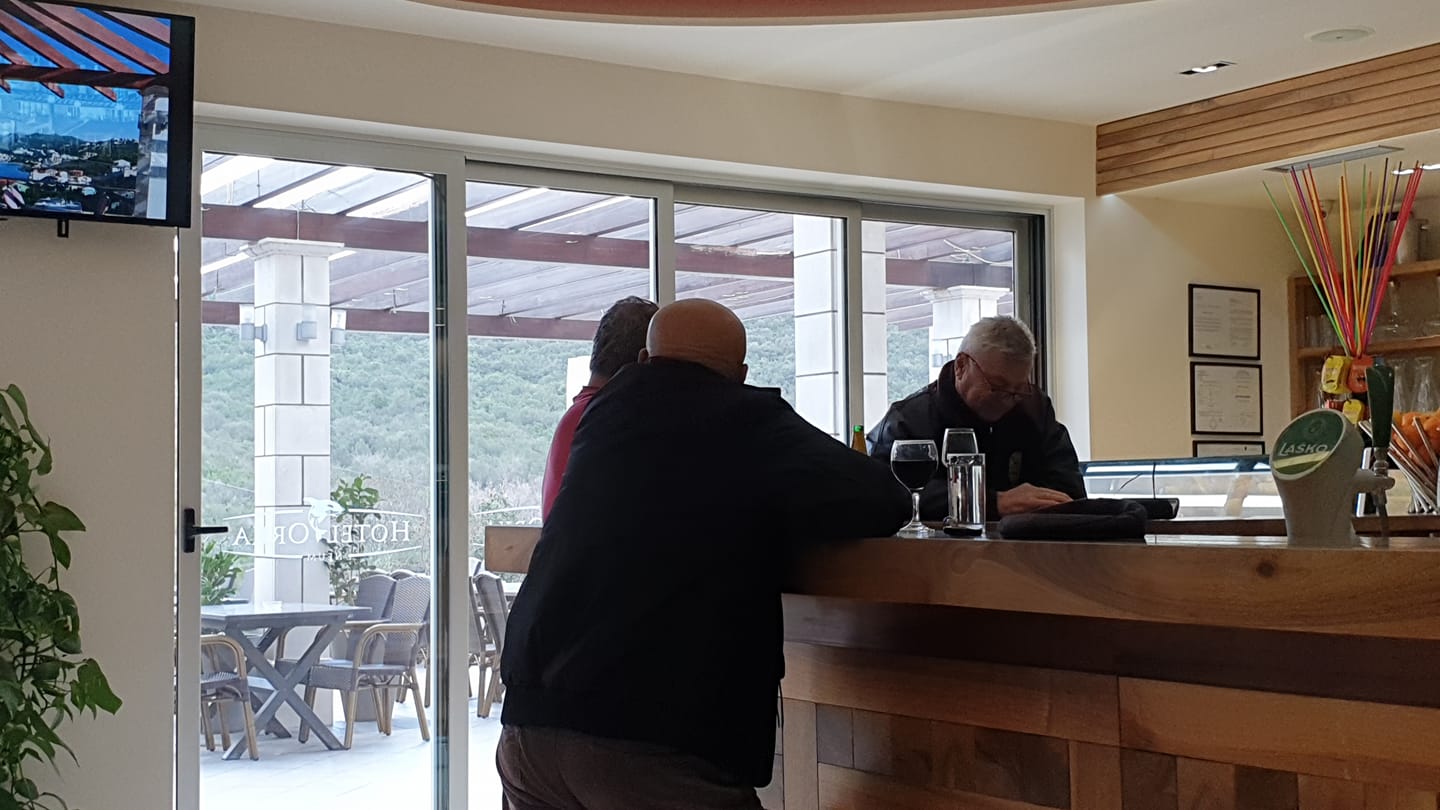
And I was only seconds into my old comfort zone before I encountered yet one more blast from the past - Balkan cafe philosophy. It has been a while since I had been privy to the pearls of wisdom that emanate daily from the cafes of the region, and it was good to have back in my life (I think...).
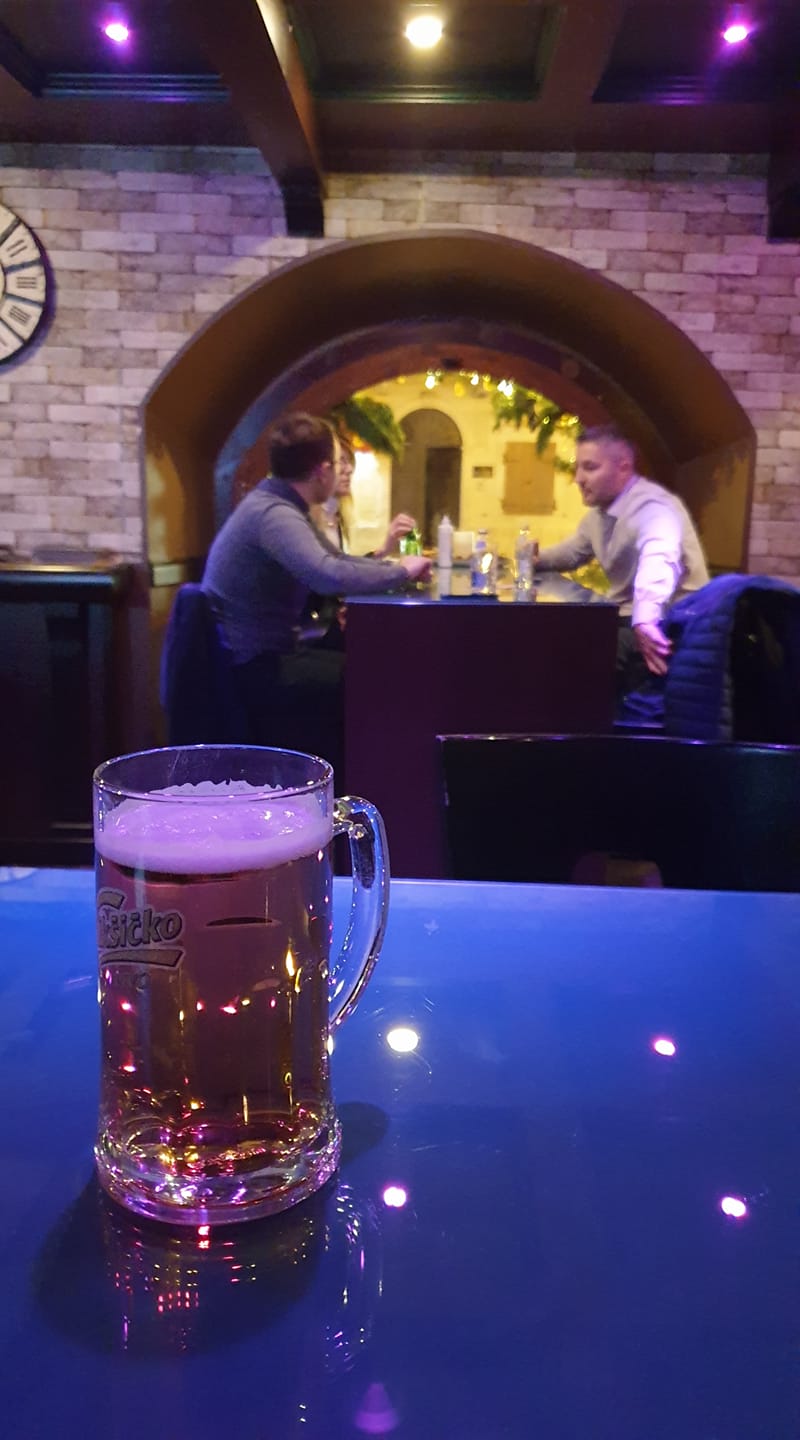
On to Montenegro and a first meeting, where my initial information was that only hotels could be open and serve, but then a secondary source said that all bars and restaurants could now work until 22:00, after which there was a nationwide curfew.
Once the border guard on the Croatian side was up to speed with the new rules, it was straight to Kotor old town and a meeting in a pub - just like life used to be. I can't tell you how nice it was to be back to how things used to be, or how people were observing distance in a way I don't see as much in Croatia. The evening curfew, which is also in effect in Bosnia and Albania, gets people back to their homes at night, so less house parties, while allowing businesses to operate, and for people to meet. From a psychological point of view, after weeks of closed bars and restaurants, it felt revolutionary. I am no expert in these things, but closed cafes and no curfew v open cafes and an evening curfew seems to have only one logical winner.
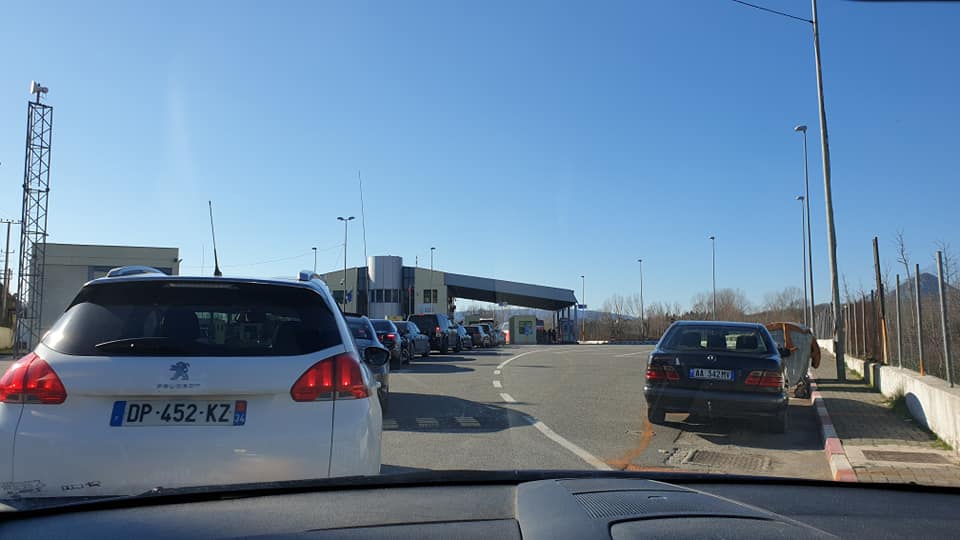
On to Albania. A 30-minute wait at the border, but a vehicle and passport check only.
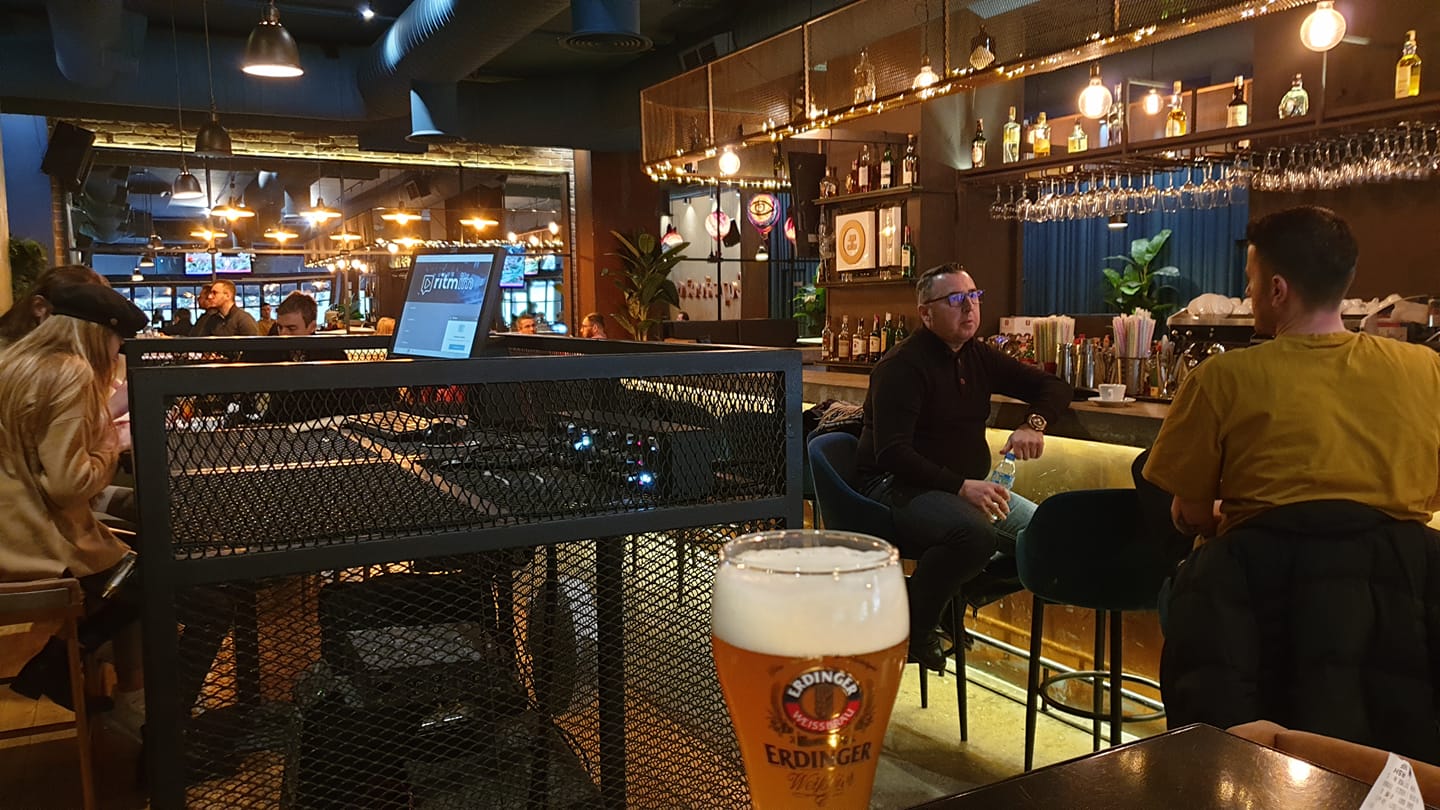
I spent the biggest part of my trip in Albania, and the longer I stayed, the more comfortable I was about a return to the old normal. More people wore masks in the streets than in the other countries, and the rules were more rigidly adhered to inside buildings. And it is interesting to note that Albanian corona deaths per capita are considerably less (more than 50% less) than their Balkan neighbours.
There is another aspect to this, especially in periods of prolonged lockdown - the psychological effects. Just having the option to go somewhere, even with restricted opening hours, makes a big difference mentally, as well, of course, as the economic effect for cafe and restaurant owners. It will be interesting to see what route Croatia chooses with the expected new measures on February 1.
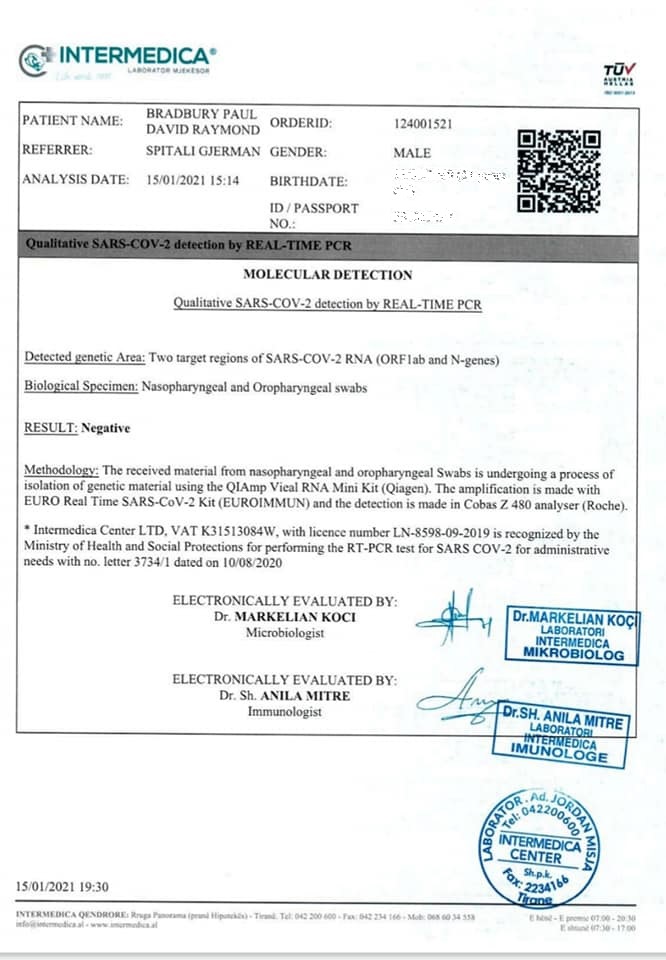
Yet more border rule changes from Croatia as I was out of the country, mostly affecting travellers from the UK. I knew that I needed a negative PCR test no older than 48 hours for re-entry, and finding a place that could deliver this in Tirana was the first thing I needed to sort on arrival. The German Hospital was the place to go. And for just 71 euro, I had the pleasure of a swab up both nostrils and the back of the throat, with the negative results sent by email and WhatApp less than three hours later. Very efficient.
The most challenging border on my return would be entering Croatia and showing the PCR test, but that was also very efficient. I showed the email from the hospital and was given a piece of paper with instructions and an email address to forward the test (the Croatian border police). And once it was sent, I was on my way.
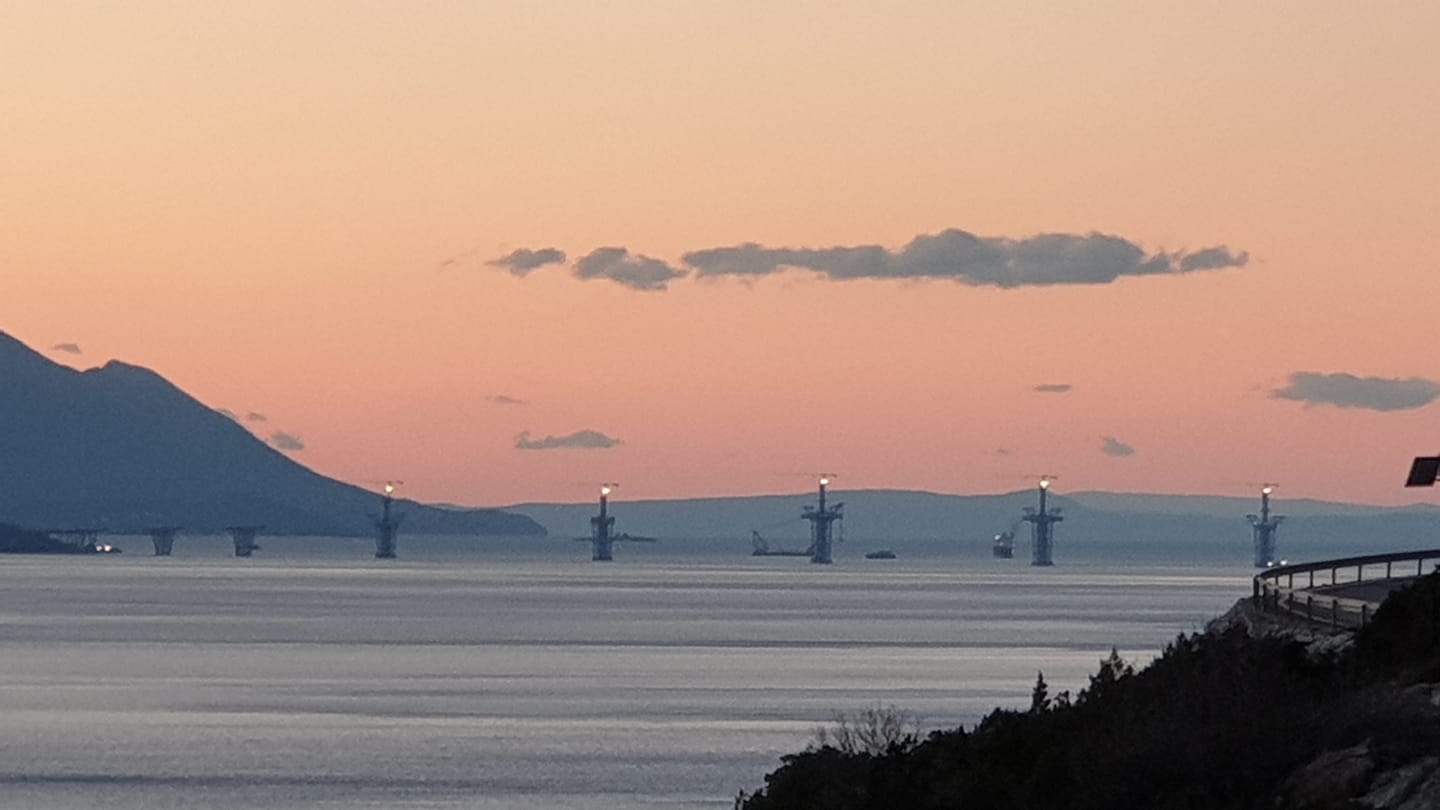
Next destination, the island of Hvar and ferry to Sucuraj, but where to stop for a late lunch on the way? With everything closed in Croatia, the only option was Neum once more, which provided me enough sustenance for the final leg of the journey.
But the view from Neum shows how this region is changing, and the Neum Corridor will be much less busy when the Peljesac Bridge finally opens (in, from memory, 2022).
Let's hope Croatia will have opened its bars and restaurants by then.
For the latest travel info, bookmark our main travel info article, which is updated daily.
Read the Croatian Travel Update in your language - now available in 24 languages.
Join the Total Croatia Travel INFO Viber community.
Ski Season on Sljeme Ski Resort Starts January 19, 2021
January 17, 2021 – To the delight of many Zagreb citizens, but also people from other parts of Croatia, the ski season on Sljeme ski resort begins on Tuesday, January 19, 2021.
As reported from Sljeme, recreational skiing will be possible every day from 9 am to 4 pm. The ski season will be organized according to the given epidemiological framework, as follows:
- the maximum number of people allowed on the ski slope is 1,000,
- only daily tickets will be on sale to control and monitor the number of users,
- masks or face covers are obligatory on the ski resort, and it is required to keep the prescribed distance of 1.5 m,
- cable cars and lifts are used according to the instructions of the Ski Resort staff,
- the Sljeme Ski Resort employees will be present at the facility to supervise the implementation of epidemiological measures, and intervention police officers will also be present to implement the rules of conduct at the Sljeme Ski Resort.
More detailed information will be released earlier this week.
Sljeme was closed to the public after the Snow Queen Trophy. Currently, only training of athletes is approved on the Sljeme ski slopes, which have been approved by the Decision of the Civil Protection Headquarters. Since last weekend, it has been allowed to use the bottom of Činovnička meadow for sledding, and many visitors seized that opportunity to enjoy the winter, especially with children.
Two days ago, the situation on Sljeme was clarified for the Jutarnji list by Igor Žiljak, the ski resort manager.
"The slopes are ready. We will use this weekend, during which there will be temperatures below zero, to make additional artificial snow and snow the Red, White, Green, and Blue descent. We've been working hard since October, and we're ready for skiing. But we are waiting for the decision of the Zagreb headquarters. The headquarters in the Primorje-Gorski Kotar County allowed Platak and Čelimbaša to ski, we hope that this will happen to us as soon as possible," said Žiljak two days before the news of the opening of Sljeme.
There it is, to the joy of many Zagreb residents but also visitors from other parts of Croatia. From Tuesday, they will be able to enjoy the winter on Sljeme.
Property of the Week: Business Premises in UNESCO World Heritage Site
January 17, 2021 - Trade like a Roman Emperor with your very own business property in Diocletian's Palace, the very heart of Split.
It all started when one man thought it would make for a nice location for a retirement home...
That man happened to also be a Roman Emperor, and the name of Emperor Diocletian has been immortalised in Dalmatia by the impressive retirement palace which bears his name, and which has been a UNESCO World Heritage Site since 1979.
There are also few places in Croatia which have undergone such a transformation as the palace in the 18 years I have been living in Croatia. When I first came, Split was known as the 'Gateway to the Islands', and the warren of tiny streets and alleys were much less lively - and even a little intimidating in winter.
As tourists discovered the magic of Split, so too did the nature of Diocletian's Palace change once more in its 1700-year history. Boutique hotels, AirBnBs, restaurants and wine bars, arts and craft shops. On every corner, something new to experience, buzzing with life. Diocletian's Palace became a hit.
And property in Diocletian's Palace was in big demand - and short supply.
One such offer has just come on the market, our property of the week, introduced by Trgostan, the oldest real estate agency in Split:
Split, Center - attractive business premises 33 sqm in the Diocletian's palace
Attractive business premise of 33 sqm within the walls of the Diocletian's palace, in Dominisova street, whole ground floor of an old stone house, in excellent condition, ideal for different purposes, possible to rearrange it into an apartment - excellent business/rental potential.
Price 135,000 euro. For more information, and to book a viewing, click here.
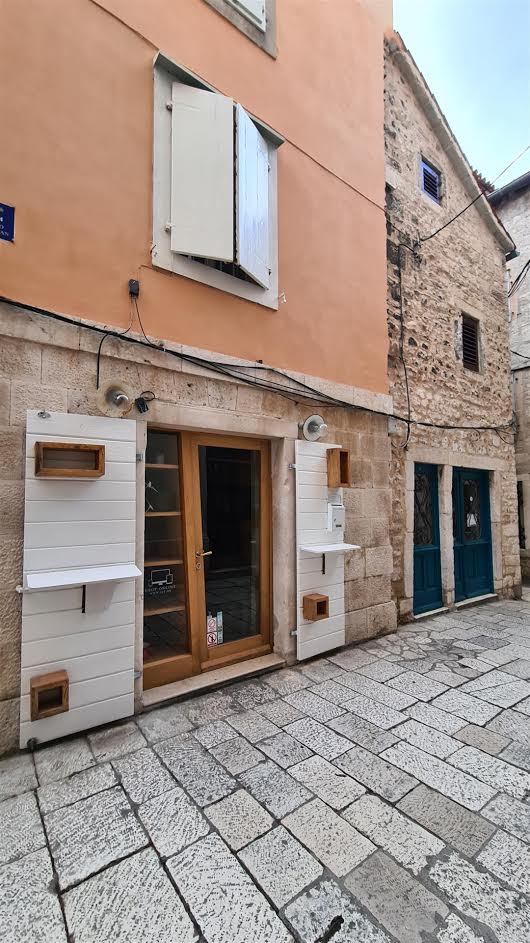
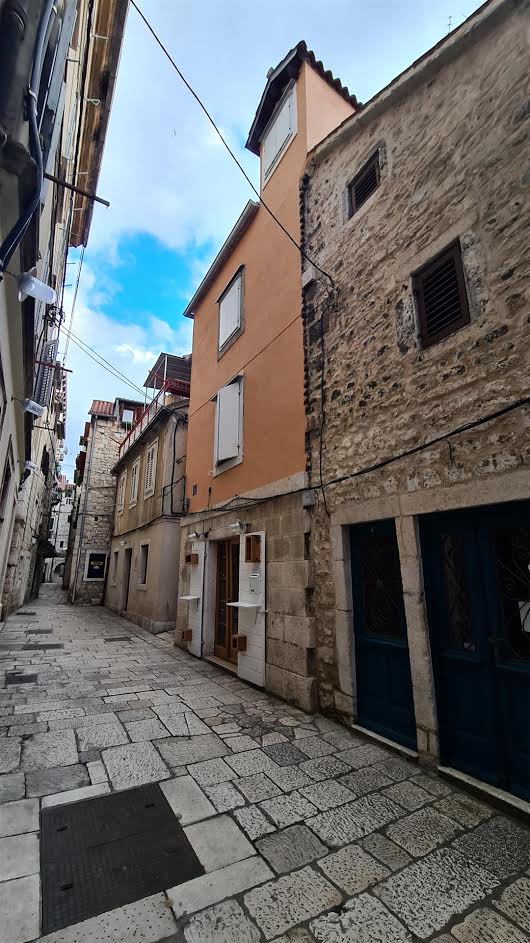
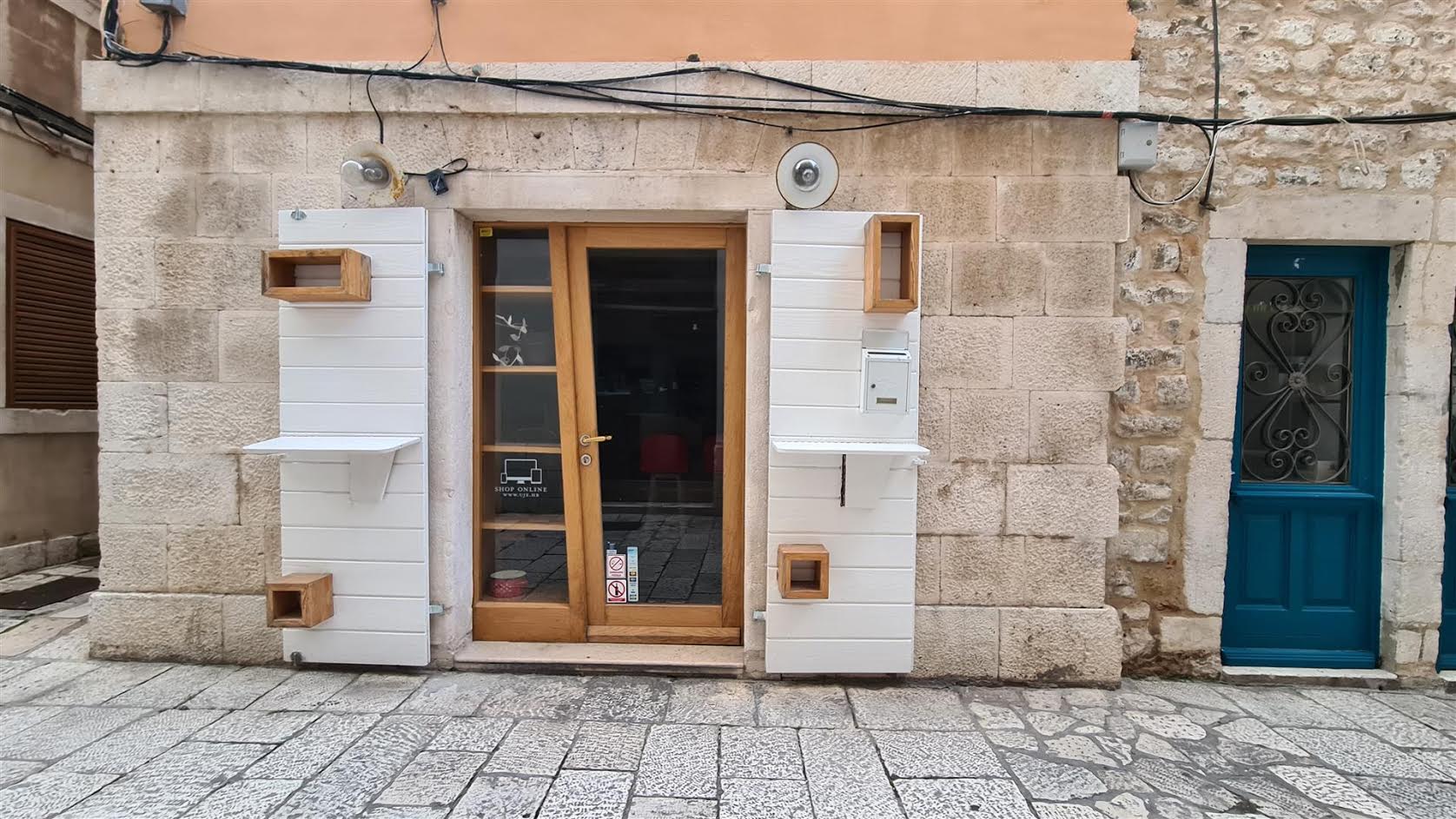
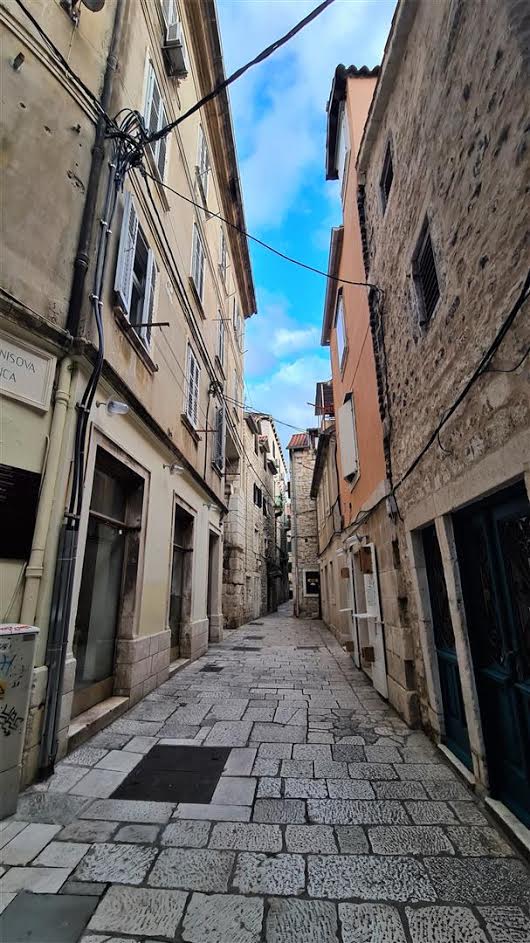
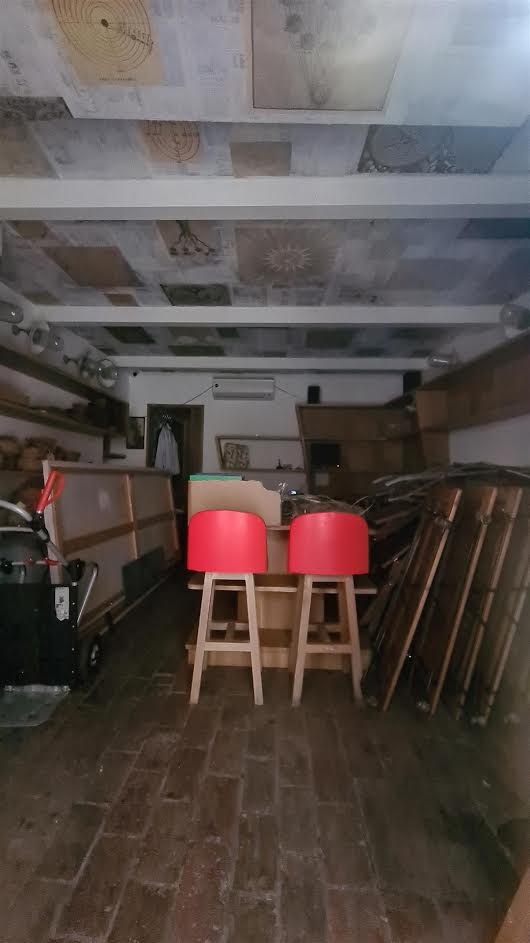
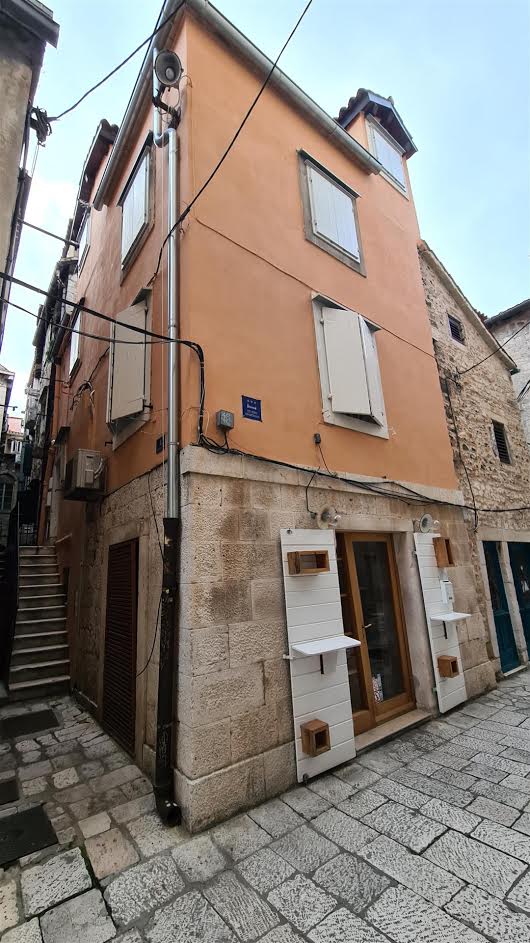
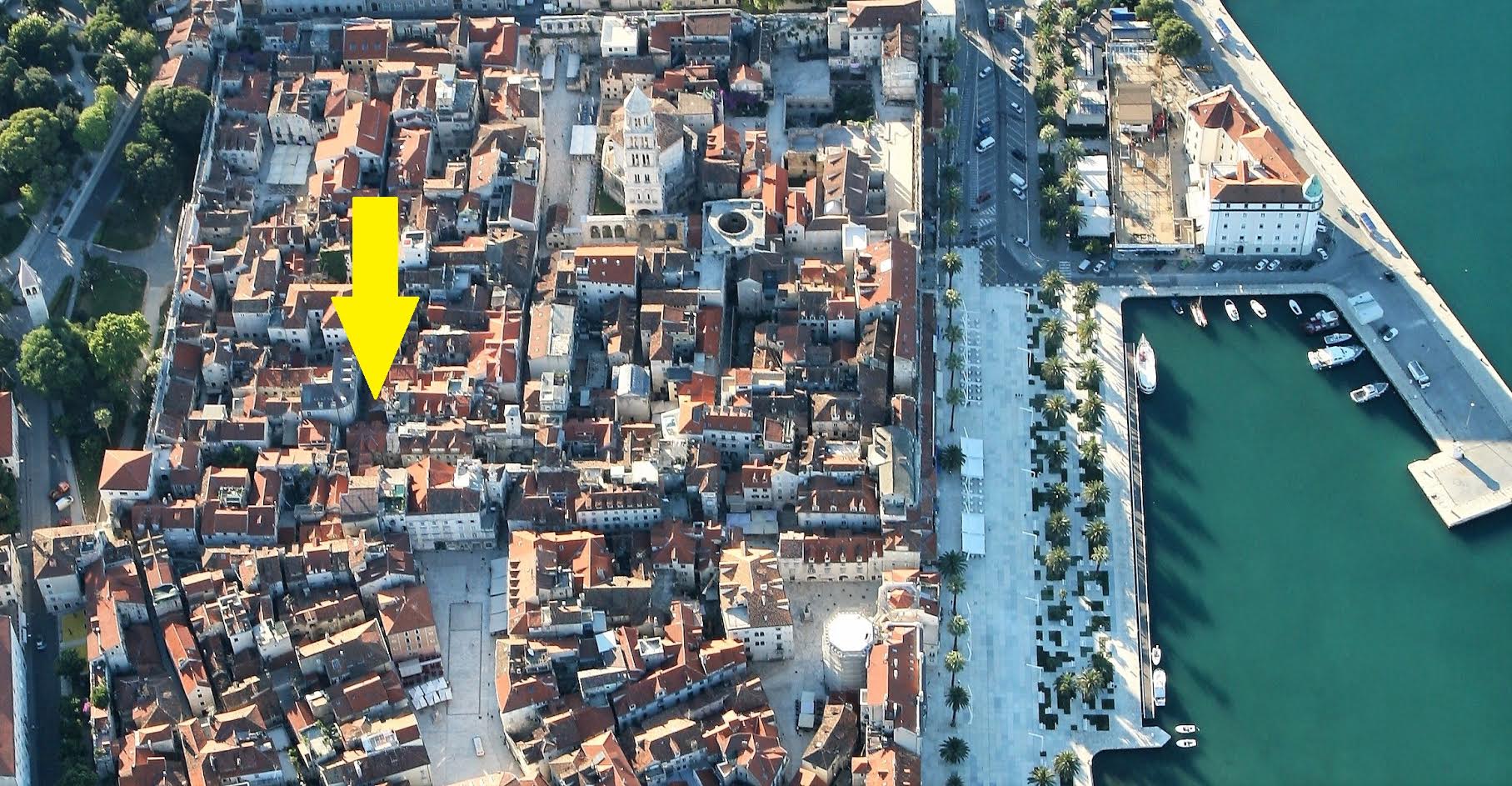
New Official Croatian Border Crossing Rules, Recommendations (January 16, 2021)
January 17, 2021 - The official Koronavirus.hr website has updated the latest Croatian border crossing rules and regulations.
On 13th of January 2021, the Civil Protection Headquarters of the Republic of Croatia issued a Decision temporarily prohibiting and restricting the crossing of persons across all border crossing points of the Republic of Croatia (NN 3/21). However, in accordance with the guidelines of the competent authorities, exceptions have been made as follows:
Passengers travelling to the Republic of Croatia from an EU / EEA member state (regardless of their citizenship)
Passengers coming directly from the countries and / or regions of the European Union, i.e. countries and / or regions which are Member States of the Schengen Area and Schengen Associated Countries, and which are currently in the so‑called green list of the European Centre for Disease Prevention and Control, regardless of their citizenship, will be allowed entry into the Republic of Croatia under the same conditions as before the onset of the COVID-19 disease (they do not need to present a negative PCR test result for SARS-CoV-2 nor are they assigned the measure of self-isolation) if they show no signs of disease and they have not been in close contact with an infected person.
If the aforementioned persons transited to the border crossing points of the Republic of Croatia through other countries / regions without delay, they should prove at the border crossing point that they did not stay in transit areas and in that case, they will not be required to have a negative PCR test result for SARS-CoV-2 not older than 48 hours, nor stay in self-isolation.
Graphic representation of countries by color according to the risk of the COVID-19 disease can be found on the website of the European Centre for Disease Prevention and Control (ECDC)
All other passengers who, regardless of their citizenship, come to the Republic of Croatia from EU / EEA member states / regions, and which are currently not on the so-called green list of the European Centre for Disease Prevention and Control, must present a negative PCR test result for SARS-CoV-2 that is not older than 48 hours (counting from the time of taking the swab to arriving at the border crossing point) or have the PCR test for SARS-CoV-2 done immediately upon arrival in the Republic of Croatia (at their own expense), with the obligation of self-isolation until they receive a negative test result. In the case of impossibility of testing, a measure of self-isolation is determined for a period of ten (10) days.
Exceptionally, the PCR test for SARS-CoV-2 is not obligatory for the following categories of passengers traveling from EU / EEA member states / regions although they come from countries that do not belong to the green list of the European Center for Disease Control and Prevention:
- workers or self-employed persons performing essential tasks, including healthcare workers, frontier and posted workers and seasonal workers as specified in the Guidelines concerning the exercise of the free movement of workers during COVID-19 outbreak, provided they do not stay in the Republic of Croatia or outside the Republic of Croatia for longer than 12 hours;
- pupils, students and interns who travel abroad every day, provided that they do not stay in the Republic of Croatia or outside the Republic of Croatia for longer than 12 hours;
- seafarers and workers in the transport sector or transport service providers, including heavy goods vehicle drivers transporting goods to be used in the national territory and those who only transit;
- diplomats, staff of international organizations and persons invited by international organizations whose physical presence is necessary for the functioning of those organizations, military personnel and police officers, as well as humanitarian and civil protection personnel in the performance of their duties;
- persons traveling for necessary family or business reasons, including journalists in the performance of their duties;
- passengers in transit with the obligation to leave the Republic of Croatia within 12 hours from entry;
- patients traveling for urgent health reasons.
The provisions regarding frontier workers apply adequately to other categories of passengers who, due to the nature of their job or occupation, need to cross the state border frequently (e.g. athletes playing for clubs in a neighboring country).
Citizens of EU / EEA member states as well as members of their families traveling to the Republic of Croatia from third countries, i.e. those that are not members of the EU / EEA
Citizens of EU Member States (including Croatian citizens), i.e. of Schengen Member States and Schengen Associated States, as well as members of their families and third-country nationals who are long-term residents under Council Directive 2003/109/EC of 25 November 2003 concerning the status of third-country nationals who are long-term residents and persons entitled to reside under other EU directives or national law or who have national long-term visas coming from third countries, upon entering the Republic of Croatia must present a negative PCR test result for SARS-CoV-2 that is not older than 48 hours regardless of their citizenship (counting from the time of taking the swab to arriving at the border crossing point) or have the PCR test for SARS-CoV-2 done immediately upon arrival in the Republic of Croatia (at their own expense), with the obligation of self-isolation until they receive a negative test result. In the case of impossibility of testing, a measure of self-isolation is determined for a period of ten (10) days.
Exceptionally, for the abovementioned persons, a negative PCR test result for SARS-CoV-2 not older than 48 hours will not be obligatory at the border crossing point for healthcare workers, health researchers and caregivers for the elderly, frontier workers, workers in the transport sector, diplomats, staff of international organizations and persons invited by international organizations whose physical presence is necessary for the good functioning of those organizations, military personnel and police officers, as well as humanitarian and civil protection personnel in the performance of their duties, passengers in transit with the obligation to leave the Republic of Croatia within 12 hours from entry and persons travelling for schooling purposes, as well as persons who travel for urgent personal / family reasons, business reasons or have some other economic interest, and do not stay in or out of the Republic of Croatia for more than 12 hours.
Third-country nationals not covered by the abovementioned points
Third-country nationals not covered by the abovementioned points may enter the Republic of Croatia from third countries, and on that occasion, they do not need to present a negative PCR test result nor a self-isolation measure will be assigned to them, only if they are:
- healthcare workers, health researchers and caregivers for the elderly;
- frontier workers (as well as e.g. athletes as stated in the exceptions for passengers within the EU / EEA);
- workers in the transport sector;
- diplomats, staff of international organizations and persons invited by international organizations whose physical presence is necessary for the good functioning of those organizations, military personnel and police officers, as well as humanitarian and civil protection personnel in the performance of their duties;
- passengers in transit with the obligation to leave the Republic of Croatia within 12 hours from entry;
- persons travelling for schooling purposes;
- seafarers (if they intend to stay in the Republic of Croatia for more than 12 hours, entry into the Republic of Croatia will be provided upon presentation of a negative PCR test on SARS-CoV-2 not older than 48 hours or by PCR testing on SARS-CoV-2 immediately upon arriving to the Republic of Croatia and by self-isolating until they receive a negative test result);
- persons travelling for urgent personal / family reasons, business reasons or other economic interest (if they intend to stay in the Republic of Croatia for more than 12 hours, entry into the Republic of Croatia will be provided upon presentation of a negative PCR test on SARS-CoV-2 not older than 48 hours or by PCR testing on SARS-CoV-2 immediately upon arriving to the Republic of Croatia and by self-isolating until they receive a negative test result).
Passengers covered by Annex I to Council Recommendation (EU) 2020/912 on the temporary restriction on non-essential travel into the EU and the possible lifting of such restriction
Passengers (regardless of their citizenship) coming directly from countries covered by Annex I to Council Recommendation (EU) 2020/2169 of 17 December 2020 amending Recommendation (EU) 2020/912 on the temporary restriction on non-essential travel into the EU and the possible lifting of such restriction do not have to present a negative test result for SARS-CoV-2 nor are they subject to self-isolation if they have not been in close contact with an infected person and show no signs of disease. During their stay in the Republic of Croatia, they are obliged to adhere to the general and special recommendations and instructions of the Croatian Institute of Public Health.
At the border crossing point, the aforementioned persons, who transited to the border crossing points of the Republic of Croatia through other countries / regions without delay, should prove that they did not stay in transit areas and in that case, they will not be required to have a negative PCR test result for SARS-CoV-2 not older than 48 hours nor stay in self-isolation.When entering the Republic of Croatia, nationals of third countries covered by the list of countries of the Croatian Institute for Public Health to whom special epidemiological measures are applied (available here) must present a negative PCR test result not older than 48 hours and they are obliged to stay in self-isolation for 14 days, which could be shortened if a person takes a PCR test for SARS-CoV-2 at their own expense on the seventh day of self-isolation at the earliest at an institution authorized to perform PCR testing and the result is negative.
Persons travelling to the Republic of Croatia for humanitarian reasons related to providing assistance to the areas affected by the earthquake
Persons travelling to the Republic of Croatia for humanitarian reasons related to providing assistance to the areas affected by the earthquake (Sisak-Moslavina County, Karlovac County and Zagreb County), regardless of their citizenship and the area from which they arrive, are allowed to enter the Republic of Croatia based on the previous consent of the Civil Protection Headquarters of the Republic of Croatia.
These persons present an exception and will be allowed to enter the Republic of Croatia without the need to present a negative PCR test result on SARS-CoV-2, nor will they be obliged to self-isolate upon entering the Republic of Croatia.
In order to shorten the procedure at the border crossing point, we advise all foreign passengers, regardless of their citizenship, to fill the announcement in advance at Enter Croatia.
General note: if the passenger’s validity of the PCR test for SARS-CoV-2 of 48 hours expired during the border control at the entrance to the Republic of Croatia or they do not have the PCR test at all and they meet other conditions of entry, they will be allowed to enter the Republic of Croatia, provided that they immediately get tested in the Republic of Croatia at their own expense, with the obligation to stay in self-isolation until they receive a negative test result.
Lifting the measure of self-isolation (imposed on the border crossing point) after the receipt of a negative PCR test result:
In such cases, passengers will receive a leaflet at the border crossing point with instructions on the actions to be taken after they receive a negative molecular PCR test result (rapid antigen tests or serological tests will not be accepted).
The leaflet will include an e-mail address of the border crossing point where the passenger was imposed the measure of self-isolation, to which he/she can send the negative test result obtained from the medical facility where the test was taken, so that the imposed measure can be lifted (removed).
These persons are obligated to take the test at the place of their temporary or permanent residence, where they have all of the necessary conditions for self-isolation until their negative PCR test result arrives.
Persons who have recovered from COVID-19 within the past three months are exempt from the obligation to provide a negative PCR test result and to self-isolate.
In order to prove their recovery, passengers need to have a positive PCR test result or antigen test result, or a positive neutralization test (NT) result obtained within the last three months and older than 14 days, or a certificate of recovery issued by a doctor.
Persons who have a negative PCR test result made in the Republic of Croatia due to a short trip to our neighboring or another country and return to the Republic of Croatia within less than 48 hours from the day of testing, i.e. within the period of test validity, will not be required to present a new PCR test from the country in which they have been staying for a short time, but will be allowed to enter upon presenting the test made in the Republic of Croatia.
When staying in the Republic of Croatia, all passengers, regardless of their category and country from which they came, are obliged to follow the general and special instructions and recommendations of the Croatian Institute of Public Health.
For the latest news regarding coronavirus in Croatia, follow the dedicated TCN section.
Porsche Boxster Celebrates 25 Years with Video on Croatian Roads
January 17, 2021 - Porsche Boxster celebrates 25 years with a stunning new promotional video on Croatian roads.
The cult car brand Porsche Boxster is celebrating its 25th birthday, and a video filmed in Croatia was presented a week ago for the big anniversary. Porsche has thus joined the company of several car brands that have chosen Croatia, and Croatian roads, to film their videos.
The Adriatic Highway was built in the 1950s and 60s and offers a beautiful view of Croatian nature in almost its entire length of 650 kilometers. Index.hr reports that the roads on the island of Pag and the Adriatic Highway stood out as the most popular locations in this 1:37 minute video.
Drivers and fans of octane sports consider the D25 Karlobag - Gospić section of the Adriatic Highway to be one of Croatia's most beautiful roads, where the bends are said to be a pleasure to drive. Porsche has also chosen to capture this location to celebrate Boxster's 25th birthday. Namely, the video sets off on a hill towards Gospić, and on the ascent, it captures several beautiful shots with a view of the Adriatic.
HRTurizam writes that this is excellent advertising for Croatia because globally known brands can only help Croatia's image around the world. It also pushes other companies to come to Croatia to film their promotional videos, but also to shoot movies and series, as we have seen in many examples thus far, like Game of Thrones in Dubrovnik or, most recently, Amazon Prime film 'Bliss' in Split.
It should not be forgotten that in addition to excellent promotion, local resources are used to record videos and films, from Croatian production teams to accommodation and business tourism. Thus, the whole story spreads and has additional benefits.
To read more about lifestyle in Croatia, follow TCN's dedicated page.
Luka Cindric Drops Out of Croatia Handball Lineup for Rest of World Champs
January 17, 2021 - Key Croatia national handball team player and FC Barcelona Lassa member Luka Cindric has dropped out of the World Championship in Egypt due to injury.
Before the match against Japan (29:29), it was announced that Cindric could miss the match due to a minor injury he suffered playing with Barcelona, but ultimately played.
Cindric played 42 minutes against Japan
Recall, Cindric spent 42 minutes on the court and scored four goals from 10 attempts against Japan. In addition, he had four assists and lost two balls.
"Cindric felt less pain and is suffering from an old injury. We will see how he feels, maybe everything will be fine, and he will play today. We will not take risks if it is not necessary," said assistant coach Hrvoje Horvat ahead of the game.
RTL commentators Goran Sprem and Petar Metlicic agreed with him, but Cindric obviously felt good enough to play.
Cindric also had injuries in the last two national team competitions
For coach Lino Cervar, there is now no other alternative in the center back position except Janko Kević from Nexe. Igor Karačić is also in Egypt, but he is recovering from inflammation of the pubis symphysis (groin area) and should be ready for the second round of the competition.
In the last two competitions, the 2020 European Championship and the 2019 World Championship, Cindric had major problems with injuries and could not adequately help the national team. Maybe that's why he had a great desire to play against Japan.
In the second match of Group C, Croatia will play against Angola on Sunday at 6 pm, and on January 19 against Qatar in the last match of the group stage.
Source: Index.hr
To read more about sport in Croatia, follow TCN’s dedicated page.
Manchester United Donates EUR 10,000 to Petrinja, Dinamo Donates 10 Containers and More
January 17, 2021 - The football world has come together from near and far to help in the aftermath of the Petrinja earthquake, as Manchester United donates EUR 10,000 to Petrinja through the Dinamo Foundation 'No Surrender'.
On January 14, Croatian champion Dinamo fulfilled its promise in delivering ten fully equipped and furnished containers with eight toilets to the village of Pecki, about 15 kilometers from Petrinja.
This is a continuation of the Dinamo Foundation's 'No Surrender' action, which began on December 30, the day after the earthquake in Sisak-Moslavina County. The next day, the club, led by the coach of the first team Zoran Mamic, brought the collected donations to the village of Pecki, where most houses were partially or entirely destroyed.
Another 27 sets of work clothes and rubber boots will arrive in the village of 100 inhabitants, which was also severely affected by the Homeland War.
Pecki was visited by representatives of the 'No Surrender' Foundation, including the Dinamo Management Board, represented by President Vlatka Peras, the first team by coach Zoran Mamic, and numerous players led by captain Arijan Ademi.
"I thank all our fans and citizens who made purchasing these containers possible with their donations to the foundation, and I invite all of them to continue donating to the foundation with us because this area will still need help," said Dinamo captain Arijan Ademi, while coach Zoran Mamic added:
"The history of this village, the Homeland War, the first line of defense. This gives another special motive to do our best to help these people as soon as possible and as efficiently and generously as possible."
Manchester United also took part with a donation
The Manchester United Foundation even joined the Zagreb club with a donation of EUR 10,000, while the Scottish giant Celtic and numerous Italian and German clubs also came forward. To date, more than HRK 667,000 has been donated to Dinamo's campaign.
The value of Dinamo's donation to the village of Pecki is HRK 450,000, and the rest of the donation will be used to help those in Banovina whose property was damaged in the earthquake. The next action carried out by Dinamo is purchasing a container for its former player Radimir Bobinac.
Numerous athletes and clubs in Croatia are coming together for Petrinja, including Split club Hajduk, which has already sent several donations to the earthquake-affected areas. In its latest action, Hajduk is selling shirts of their legendary players through an auction.
To read more about sport in Croatia, follow TCN’s dedicated page.
Zagreb Public Transport Provider ZET Reducing Bus and Tram Lines
January the 17th, 2021 - The Zagreb public transport provider ZET has announced that it will be reducing the number of both buses and trams running on its network due to the current drop in demand across the Croatian capital.
As Poslovni Dnevnik writes, the Zagreb public transport provider ZET (Zagreb Electric Tram) reported that it will reduce its operational tram and bus lines due to the general reduction in traffic demand which is being seen at the moment.
ZET will cut its services for a relatively short period of time, more specifically from January the 18th until January the 29th.
"Due to the decision of the Ministry of Science and Education to hold distance learning for higher grades of children attending primary schools, secondary schools (with the exception of high school graduates) and colleges, traffic demand is expected to decrease and accordingly from the 18th to the 29th of January, the tram lines 2, 3, 4, 6, 7, 9, 11, 12, 13, 14 and 17 will continue to operate but according to an adjusted timetable on working days/week days.
Additionally, individual departures on the following bus lines will be reduced: 109, 115, 118, 121, 125, 172, 212, 224, 226, 231, 232, 269 and 281,'' the Zagreb public transport provider ZET announced in a recent statement, and N1 reported.
For the latest travel info, bookmark our main travel info article, which is updated daily.
Read the Croatian Travel Update in your language - now available in 24 languages.



